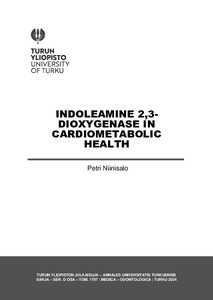Indoleamine 2,3-dioxygenase in cardiometabolic health
Niinisalo, Petri (2024-05-11)
Indoleamine 2,3-dioxygenase in cardiometabolic health
Niinisalo, Petri
(11.05.2024)
Turun yliopisto
Julkaisun pysyvä osoite on:
https://urn.fi/URN:ISBN:978-951-29-9715-2
https://urn.fi/URN:ISBN:978-951-29-9715-2
Tiivistelmä
Regulation of immune response is an important factor in determining progress of cardiometabolic diseases that may ultimately lead to atherosclerotic endpoints and premature death. Previous investigations have emphasized immunosuppressive and therefore protective role of intracellular enzyme – indoleamine 2,3-dioxygenase (IDO) – in the development of atherosclerosis. Recently this perspective has been challenged, consequently creating uncertainty of the true function of the enzyme.
The aim of the current study was to elucidate the role and functional mechanisms of IDO in the development of cardiometabolic diseases, especially visceral obesity, metabolic syndrome and atherosclerosis.
Data from three different human cohort studies was used in this thesis; 921 participants from Health 2000 -study, 30 patients from Tampere Vascular Study (TVS) and 927 participants from the Cardiovascular Risk in Young Finns Study (YFS). Association between IDO activity and atherosclerotic risk factors was evaluated by correlation analyses from Health 2000 and YFS-cohorts. Association of IDO in visceral obesity was also investigated in risk ratio analysis from YFS-cohort. Functional role of the enzyme was characterized in gene expression and immunohistochemical analyses executed from tissue samples of TVS.
Considerable variation in statistically significant associations between IDO and risk factors was found in Health 2000 and YFS-cohorts and also between sexes. Premenopausal status of females seemed to delay progression of obesity by influencing IDO activity. In males the mechanism was presumably different. IDO also forecasted slightly increased risk for obesity that was less pronounced in females. Presence of IDO, and up-regulation of IDO and related inflammatory components in human atherosclerotic plaques were also verified.
Presence and operation of IDO in atherosclerosis is unconditional. However, the exact function and role is still cryptic. Under these circumstances, obtained results do not support the use of IDO as a therapeutic target or diagnostic marker; exclusive use as a marker do not provide sufficient evidence to evaluate the state of atherosclerosis in humans, whereas controversial results suggest that the nature of the enzyme may be volatile and regulated by external immunological signals.
The aim of the current study was to elucidate the role and functional mechanisms of IDO in the development of cardiometabolic diseases, especially visceral obesity, metabolic syndrome and atherosclerosis.
Data from three different human cohort studies was used in this thesis; 921 participants from Health 2000 -study, 30 patients from Tampere Vascular Study (TVS) and 927 participants from the Cardiovascular Risk in Young Finns Study (YFS). Association between IDO activity and atherosclerotic risk factors was evaluated by correlation analyses from Health 2000 and YFS-cohorts. Association of IDO in visceral obesity was also investigated in risk ratio analysis from YFS-cohort. Functional role of the enzyme was characterized in gene expression and immunohistochemical analyses executed from tissue samples of TVS.
Considerable variation in statistically significant associations between IDO and risk factors was found in Health 2000 and YFS-cohorts and also between sexes. Premenopausal status of females seemed to delay progression of obesity by influencing IDO activity. In males the mechanism was presumably different. IDO also forecasted slightly increased risk for obesity that was less pronounced in females. Presence of IDO, and up-regulation of IDO and related inflammatory components in human atherosclerotic plaques were also verified.
Presence and operation of IDO in atherosclerosis is unconditional. However, the exact function and role is still cryptic. Under these circumstances, obtained results do not support the use of IDO as a therapeutic target or diagnostic marker; exclusive use as a marker do not provide sufficient evidence to evaluate the state of atherosclerosis in humans, whereas controversial results suggest that the nature of the enzyme may be volatile and regulated by external immunological signals.
Kokoelmat
- Väitöskirjat [2889]
